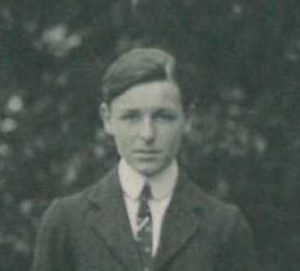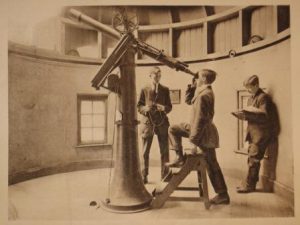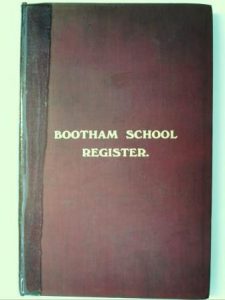“We are informed that Arthur L. Lean (1886-1889) was left absolutely free to continue his business as a patent agent in Berlin after the outbreak of war and, although business was dull, earned £10 during August.”
From ‘Bootham’ magazine
“We are informed that Arthur L. Lean (1886-1889) was left absolutely free to continue his business as a patent agent in Berlin after the outbreak of war and, although business was dull, earned £10 during August.”
From ‘Bootham’ magazine
Joe Thorp had got a job in the general merchant’s office in Hobart. In a letter he mentioned the enormous excitement over the war, with newspaper specials. “The military are taking their chance and using all their influence and power over the people for defence purposes, whilst the numbers up at the military camp, Pontville, for those going to the front, increase every day, and it is so difficult to get away from the fact that Australia is a warlike nation (as well as an amusement-loving nation!).”

From ‘Bootham’ magazine
A letter was received informing the school that it would not be needed as an emergency hospital next term. ‘The city has now returned to normal conditions so far as is possible, and the military element in York and neighbourhood appears much as usual.’
From the Committee minutes
We’re running tours of the observatory on Saturday 13th September and Sunday 14th September as part of Heritage Open Days this year. Bootham School has had an observatory and encouraged young astronomers for over 160 years. Come and explore the current observatory, which was opened in 1902.

You can find all the details on the Heritage Open Days website, along with other local events. Tours must be pre-booked.
The Committee met to debate the question of what would happen to Bootham and the Mount. Accommodation was available in various places, but there was concern that York would not be a desirable place for boys to be, that York would be ‘glad to be spared the feeding of two or three hundred persons who could not be of any service to the City for staying’, that the ‘one-ness’ of each school would be hard to maintain with pupils scattered about the City, and that it would be asking too much of the kindness of York Friends, and too much of a burden for the staff. No definite decision was reached.
A summary of the Committee minutes of 19th August 1914.
In 1914 the first edition of the Bootham School Register was published. It included (as far as was known) the names, dates and biographies of all the boys that attended the school up to that date. 1988 names were included in all. As well as being a useful way of finding out about Old Scholars, it provides a useful insight into the period, for example what occupations people had, and how they spent their free time. It also includes a number of memories of schooldays. A number of the entries make reference to the character of the individual.

Below are some examples of extracts from the Register (hopefully the first in a series of posts).
Thomas Henry Allis (Lawrence St 1830-31) Osbaldwick, York, Commercial Traveller … Apprenticed to Jarvis Brady, Leeds, Grocer : later was with Godfrey Woodhead, Manchester : Latterly in shop, and then travelled for Tuke & Co., Tea Merchants, Castlegate, York : Taste – T.H.A. inherited much of his father’s taste as a naturalist – His sister, the late Elizabeth Pumphrey, wrote: “T.H.A. took to his Father’s Collection of Lepidoptera [group including butterflies and moths] and amalgamated them with his own, which was ultimately, I believe, second to but one out of London. This collection was, after T.H.A.’s death, presented to the York Museum. T.H.A. was accustomed to go into the woods with a dark lantern to sugar the trees and fences, and on returning the following evening to capture such moths, etc., as were caught : On one occasion he was accosted as a poacher by a keeper near Heslington. One summer he thought that the Convolvulus Sphinx moth ought to be found about a bed of Petunias that he saw in James Backhouse’s Nurseries in Fishergate, and he persisted in going to the gardens night after night until he was rewarded by finding numbers of what was thought to be almost extinct in the neighbourhood….”
William Henry Broadhead (Bootham 1855-58) An enthusiastic archaeologist and naturalist ; Spent much time in photographing and recording the Templar Marks on old houses in Leeds, most of which are now pulled down : embodied results of researches in paper read before Thoresby Society : Also interested in Egyptology, especially in connection with Pyramids : Hobbies – Photography, lock-mending.
Samuel Southall Burlingham (Bootham 1870-72) Hobbies – A devotee of fen skating and touring on the ice (when there is any in England). In 1881 traversed on ice almost the whole distance from the mouth of the River Nene to the Trent, near Gainsborough, via Spalding, Boston and Lincoln. In 1903 skated nearly 100 miles in one day.
Jackson Ebenezer Day (Lawrence St 1839) Within 5 minutes of his arrival at Lawrence Street he produced from his playbox a football, which he kicked across the playground. Up went a window, and J. Ford called out “Ebenezer Day, we do not allow such rough games as football here.” Many years after [in1862] J. Ford introduced the game himself, giving the ball the first kick.
“We are almost beleaguered in Shanghai in these days. The shipping dare not move in case of being received in an unfriendly spirit, trade is at a standstill and we only get about twenty words from Reuter each day dealing with the European situation. To make matters really cheerful the Chinese, taking advantage of the absence of all warships from the port, have indulged in a little gentle rioting. . . . However, our troubles are as naught to yours, and I do trust that you folks at home haven’t been chastened by invasion or lack of food.” From ‘Bootham’ magazine
The war affected the school and its Old Scholars in all sorts of ways. Old Scholars followed their conscience in different ways, with some joining organisations such as the Friends Ambulance Unit, some being imprisoned as conscientious objectors, and some took up arms. We will be posting about what happened at Bootham and news that came in from Old Scholars on this blog over the next four years. Use the First World War category to find the posts (as far as possible, dates of posts will match the dates of events 100 years ago). You can also follow the news on Twitter (@BoothamWW1). For staff and students, there will be a display in school.
Check the First World War page for more links.
“On Wednesday, August 5th, one of the York doctors asked if it would be possible to use the two Schools as hospitals for the wounded in case of necessity. Those members of the sub-committee who could be communicated with, met and considered the question at once, and found that they had little, if any, choice in the matter, as it was evident that a refusal would have resulted in the premises being formally commandeered either for this purpose or more probably for use as common barracks. Many of the Elementary Schools, as well as St. Peter’s and Archbishop Holgate’s, had already been commandeered as barracks for soldiers, 80,000 of whom it was said would require accommodation in York before being transferred to other places. In the circumstances, the Sub-committee thought it was wise at once to agree to allow the local branch of the St. John Ambulance Association to use the two Schools as hospitals. As the officials thought that a naval battle was imminent in the North Sea, we were asked to have fifty beds ready at Bootham in the shortest possible time.” From the Committee Minutes, 19 August 1914